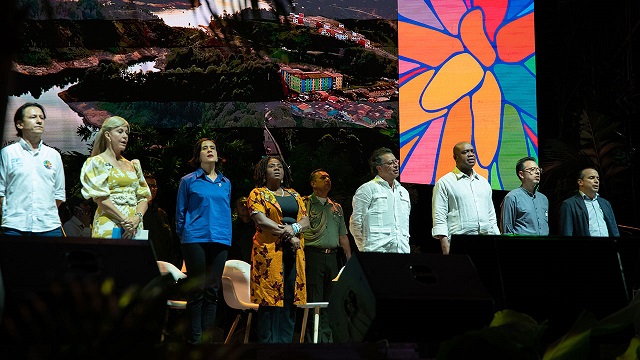
The international UN conference on biodiversity attempts to achieve key agreements, and fulfill prior ones
ANALYSIS | AGENCIES | The southwestern Colombian city, Cali, has recently hosted COP16 or the 16th Conference of the Parties (COP) to the UN Convention on Biological Diversity. The UN conference on biodiversity began on October 21 and concluded on November 1.
According to the UN, the convention on biodiversity seeks to, “to protect 30% of the planet, including terrestrial, marine and freshwater areas, transforming them into protected areas by the end of this decade. In addition, the framework emphasises the restoration and protection of critical ecosystems, such as rainforests and wetlands.”
The goal of the COP16 was for the “representatives from more than 190 countries to define the actions with which they seek to protect what, in essence, allows humans to continue living: the balance with nature.” In other words, COP16 was a multinational effort to work for the conservation of the environment and biodiversity.
Initially, COP16 was set to be held in Turkey, but due to the earthquakes, they were unable to host. It was then that the Colombian government of Gustavo Petro offered to host the event.
In his address to the conference, the Colombian president said that the free market cannot stop itself from depredating ecosystems and called for the regulation of the market in order to protect life on earth. He also called for the decarbonisation of the economy, and a change in the external debt that certain countries have with large markets in developed countries in exchange for carrying out activities that protect the ecosystem.
“Deluded are those who think that by making a free market they will be able to control the causes of the extinction of life on the planet”, Petro wrote in his X account. He also warned about the dependence that Artificial Intelligence has on fossil fuels for its operation.
For his part, the Secretary General of the United Nations, António Guterres, emphatically requested that countries turn all their speeches and good intentions into concrete actions to save planet Earth.
“We are not on the right track,” Guterres harshly stated.
Limited progress on agreements
After several days of talks between the UN Secretary General, five presidents, and more than 115 secretaries of state, the negotiations dampened an atmosphere that until a few days ago was full of hope and optimism. The main issue was how the financing of the planned projects will be obtained, which on more than one occasion has pitted the countries of the North against those of the South.
20 Ministers of Environment from the Global South released a statement during COP16, ‘Seeking Accountability on Ambition for Nature Finance’, calling on global north countries to “Act urgently to ensure that at least USD 20 billion per year is delivered from developed to developing countries by 2025 and that at least USD 30 billion per year is delivered by 2030, as agreed in the GBF.”
Following the statement’s release, Dr. Iziaq Kunle Salako, Minister of State for Environment, said the statement was, “a call to action, and this is an offer to work together to increase accountability and transparency. Let us be united on the road to ambition – let us work hand in hand to ensure we reach our common goal of fully implementing the Kunming-Montreal Global Biodiversity Framework.”
Countries also raised the issue that in order to even access financing, they must overcome excessive bureaucratic obstacles that hinder the speedy implementation of agreed upon public policies.
For their part, the developed global north countries declared that they were cautious about giving more money, arguing that the problem is not whether there are new funds, but the access of developed countries to these funds. In this regard, the French Secretary of Ecology, Agnes Pannier-Runacher said that the creation of a new fund will not solve the fundamental issue of access to funds.
Despite this, in the final stretch of the talks, several developed countries such as Germany, Austria, Denmark, France, Norway, Sweden, New Zealand and the United Kingdom, among others, disbursed more than 400 million dollars to start implementing some of the programs outlined at COP15 and COP16. While this has inspired some hope, it is a far cry from the necessary 20 billion.
COP16 limits and broken promises
Two years ago, 190 countries signed a commitment to protect 30% of the earth from environmental destruction by 2030. It was also proposed that 50% of environmental liabilities be remediated. Another pledge was that industrialised countries would transfer a total of USD 20 billion annually to the Global Environment Facility.
However, only 35 countries have submitted concrete action plans for the care of 30% of the territory to achieve this goal. Moreover, of the USD 20 billion pledged, only USD 200 million has been paid, while these countries have spent USD 1.2 trillion on armaments, making it clear that their failure to contribute is not due to a lack of resources.
As is the case with most UN climate meetings, the most polluting countries that benefit most from the exploitation of the natural resources of underdeveloped countries have not taken concrete measures to mitigate the damage caused by such profits. This imbalance threatens not only some kind of geopolitical balance between the north/rich/polluting and the south/poor/polluted but also the balance of the planetary ecosystem, which is already permanently affected.
****
Source: People’s Dispatch
 The Independent Uganda: You get the Truth we Pay the Price
The Independent Uganda: You get the Truth we Pay the Price



